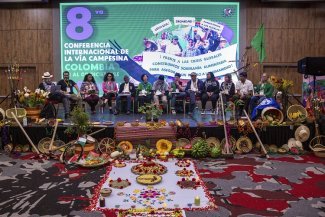“Let your beard grow, shave your moustaches/Come on, soldiers, let’s kill whoever’s in their houses/See how many girls I kidnapped in the latest clashes?” These are the opening lyrics of Daadoush (“Little ISIS”), written in 2014 by the Syrian rappers Mahdy Alkelany and Mohamad Zain, a song that had attracted tens of thousands of views before it was removed YouTube.
It is an unusual case that went unnoticed by most Western observers. As far as we know, they are the only ones to have written songs against the self-proclaimed Islamic State (IS, also known as ISIS) since the terrorist group launched its invasion of a third of Syrian and Iraqi territory in 2013. Meanwhile, the jihadists’ sophisticated musical and visual productions, like those of other radical Islamist factions of the Syrian opposition, have managed to attract and terrorise a wide audience.
Alkelany and Zain decided not to succumb to the fear, and so they wrote a rap parody of IS. “The main reason we composed the song is because IS is a horrific thing. When IS first emerged people began to talk about the terrible things they were doing, and would say ‘They’ll do this or that to us’. They were very frightened. We thought, ‘What are you talking about? We shouldn’t let them scare us,’” explains Zain, a Shiite born in 1991 in Homs.
His Shiite ideology, close to that of the Alawites dominating the Syrian regime, is only relevant in that the other half of the duo, Alkelany, born one year before him in the same city, is a Sunni. The two of them share musical inspiration and an apartment in Istanbul with a Druze violinist, another of the Syrian minorities.
The utopia that their friendship, in contrast with the cruel sectarianism that has taken hold in the Syrian conflict, is an example of peaceful coexistence in a distant future.
In Daadoush, Alkelany plays the role of an IS emir, making a mockery of his soldiers, whilst Zain plays the terrorist group’s press chief. “It is black humour,” explains Zain. “Everybody was very worried about us. Laughing in the face of your enemy is like insulting it.” Nevertheless, the song started to catch on, not only amongst their usual audience, teenagers, but their parents too. “Some of the parents would ask us to let to them listen to Daadoush,” they comment, amidst laughter, while rolling cigarettes in their apartment in the Kurtuluş neighbourhood.
The duo, with a timid presence on social media, earn a living like many other Syrian musicians, playing popular music on the streets, at the same time as trying to pursue their own rap music, which, since the war and their arrival in Istanbul, has been evolving towards more electronic, intimist and oneiric rhythms.
“The war was a big step forward for us in terms of our way of thinking. We came to understand a lot of things all at once, things that we did not know. It was an experience rich in ideas. We began to place unconnected ideas, that somehow seemed connected to us, in our songs,” explains Alkelany. In one of their latest productions, Yabah Yabah, they explain how the conflict was triggered with a traditional children’s song.
The duo is part of a very small group of Syrian rappers from the pre-war period. Hip hop made its way to Syria in the 1990s, and still only reaches a very small audience there. Since the onset of the war, hip hop music has only been tolerated by the Assad regime if the contents are not critical, and at the turn of the millennium, there were only four or five notable rappers in Syria. It is difficult, also, to assess their popularity, given that YouTube was not accessible under the regime and the most established rappers would perform in their own neighbourhoods.
Since Alkelany and Zain reached Turkey, which has taken in almost four million Syrians, rap has been spreading among musically talented refugees as a way of expressing ideas through home-produced music. The duo’s beginnings in Syria were by no means easy. Their first recordings, in 2006, spoke out in support of the Palestinians and against Israel. They never imagined they would end up singing about their own war.
“There were no rap fans in Syria at that time. We were such an oddity. People in the community think you’re either gay or the devil if you’re a rapper. We had a really tough time,” explains Zain. They recall how during one of their few concerts, staged in their neighbourhood of Behit Walid with equipment lent to them by Zain’s uncle, the neighbours cut off their electricity supply.
Rappers with a cause
The few Syrian rappers that existed when the war broke out affiliated with different sides. Another famous rapper, Volcano, who began composing with Alkelany in 2004, sided with the regime. Some of the songs on his YouTube channel have attracted more than 2.7 million views. The rapper appears in the middle of armed soldiers. Volcano, who declined to be interviewed for security reasons, says he has broken all ties with the conflict.
By contrast, Esmaeel Tamer (or Tammr/Tamr), began rapping during his journey into exile from Syria, because he only needed a pencil and paper. His songs have earned him fervent followers among the Sunni opposition, although from his hairdressing salon in the Fatih district of Istanbul, he insists that he is not taking sides.
In one of his songs, Fitneh (Fight), which has had more than 700,000 views on YouTube, Tamer also takes up arms: “If you want to learn, just read the Koran/ It is my guide, and it taught to me to rhyme,” say the lyrics, which also criticise sectarianism. Half of the content in his songs is religious.
“I speak of religion, but not of the distorted version, like that of IS or other radical groups or even preachers who would never lend a hand to Christians,” says Tamer.
The 26-year-old Damascene, who now has six million followers on social media, saw his dream of becoming an actor cut short when the war broke out in 2011. When fleeing to Lebanon and then Turkey, he began writing lyrics and then went into design.
Tamer speaks about himself in the third person: “It is very difficult for rap to make a breakthrough in the Arab world. But when you have six million followers, it’s not a bad start. Most rappers do not reach 30,000 in a year. They do not have many followers because they lack quality, they use street language. Esmaeel Tamer has so many followers because he uses a high language register. For example, I began using religious messages against racism, because Christians and Muslims must cooperate. It is my message to the world.”
Influenced by big US stars like Tupac, Eminem and 50 Cent, Tamer says he is not taking sides in the Syrian conflict. “My family still lives in Damascus. It is a safe place. I do not want to cause any damage by affiliating with a side, be it the opposition or the regime. I keep out of it and send my message to all Syrians: Shiites, Sunnis, Christians...In 2017, my songs will be written in classical Arabic, so they can be understood throughout the Arab world.”
“I am on the side of the oppressed,” he insists, “On the side of those dying under the missiles. I am on the side of the poor people of Syria and I belong to no one, neither to the regime nor to the opposition.”
Despite his message of peace, Tamer does not have much time for rappers supporting the regime. “Volcano? I do not know him personally. He is a good rapper, with a good voice. But he is so different from me. He constantly blasphemes in his songs.”
The Syrians supporting the opposition do not seem open to any type of rap message, much less if it is conciliatory. A Syrian translator who works for one of the main US newspapers, sums it up with these words: “Rappers? Syrians that don’t take sides? Odious. IS should kill them all.”










